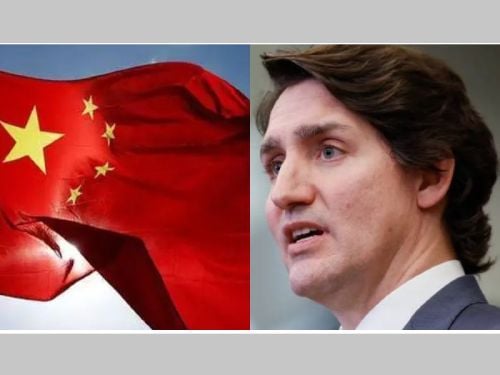By Makhan Saikia
 The way US President Donald Trump is handling Xi’s China has raised hackles of his party men. The ties between the two nuclear-armed countries could rapidly deteriorate into an economic or even military confrontations if compromise on issues, including trade, Taiwan and the SCS, cannot be found
The way US President Donald Trump is handling Xi’s China has raised hackles of his party men. The ties between the two nuclear-armed countries could rapidly deteriorate into an economic or even military confrontations if compromise on issues, including trade, Taiwan and the SCS, cannot be found
China’s grand imperial designs have no end, probably. With Xi Jinping, the country has certainly bolstered its claim over more and more territories, including the ones in the most controversial chain of islands in the South China Sea (SCS). It is nothing new for China as it has been claiming its ownership and control over the entire SCS islands. But what came as a rude shock to the international community, particularly to the nations around the SCS, was Beijing’s swift move to construct artificial islands in the disputed areas. It caused tremors in Malaysia, Philippines, Indonesia, Thailand, Brunei and Vietnam. All of them looked for an immediate intervention by the US and the other regional powers, like Japan, so as to contain China’s aggressive expansionist agenda. But then President Barack Obama maintained a feeble stance on China’s sovereignty claims. The Obama Administration did not recognise any ownership of the islands and asserted that these are international water, and, therefore, China alone cannot have its sole right to either occupy or claim them altogether. But then finally the US sent the USS Decatur, a warship into the area in the last October near the most disputed Paracel Islands, calling it as the “freedom of navigation exercises”. The White House said it was to “demonstrate lawful uses of the sea that the United States and all States are entitled to exercise under international law”.
Ironically, what the international community had witnessed was reassertion by Beijing and coming up with more construction activities in controversial islands. Meanwhile, China accused the US of an illegal act and of being “intentionally provocative”. Since then what brought the Chinese authorities to international attention was the Philippines’ successful attempt to drag the former to the UN special tribunal at The Hague. The Tribunal recognised the claims made by the Philippines and said, “China’s ‘nine-dash line’ had no foundation under the UN Convention on the Law of the Sea (UNCLOS)”. The Tribunal also declared that China had supported activities that infringe on the Philippines’ rights to stock fish and preserve marine environment.
Another remarkable judgment was given by the Tribunal regarding UNCLOS Article 121, which says that any island that can sustain human habitation or economic life is entitled to claim a 200 nautical mile exclusive economic zone and continental shelf. The Tribunal clearly said that none of the contested islands in the SCS, including the Spratly Islands and the Scarborough Shoals, are islands under Article 121. But the Tribunal did not make any judgments over issues pertaining to contested territorial claims by several nations. However, China reacted strongly to the Tribunal’s verdict and said that it will not be bound by the same. To Beijing, these island chains are its own lands and, therefore, it does not need any one’s permission or verdict to conduct any activity out there. Further, to the leadership in China, it is just asserting its sovereign territorial claims in the SCS and nothing else.
Now as the Philippines has complained that China may try to build on a reef the former’s coast. Delfin Lorenzana, the Defence Secretary of the Philippines, claimed that China’s actions would be unacceptable in the flashpoint waterway. And, he strongly believes that China would eventually reclaim the Scarborough Shoal, which is just 230 kilometre from the main Philippine island of Luzon. This is adding fuel to the fire in the SCS zone. Why China is adopting this new offensive? Is it planning to demonstrate to Donald Trump that Chinese claims of sovereignty over the SCS will remain unchanged?
It seems China is on its regular course of action whether it is the SCS or any other controversial territorial claims the nation has been making over decades. Of course, with Xi, Beijing has expanded its globetrotting campaign and shaken the entire continent. To some, China’s latest move may have been inspired by Trump’s nominee for the post of the Secretary of the State in January, Rex Tillerson, that China should be barred from artificial islands it has built in the SCS. He also said that China’s control and construction of artificial islands in waters claimed by neighbouring countries was “akin to Russia’s taking of Crimea”. In a first response to Tillerson’s comment, China’s Foreign Ministry emphasised the importance of mutual respect and cooperation with the US. Nevertheless, Lu Kang Lu, one of the spokesmen of the ministry, hinted at some hope and said that China-US relations are based on “non-confrontation, non-conflict, mutual benefit and win-win cooperation”. China has restrained from taking a tough stand against the Trump Administration so far. But all indications are that China’s attitude rightly demonstrates its control over the SCS as a foregone conclusion. If America takes up a military venture, then only it can stop China from the SCS. And it is unlikely to happen. Then, how Tillerson will move forward, remains a mystery. For, Xi, he will maintain calm as he is winding down his first term by the end of the year and the party top guns are locked in a power struggle to appoint their allies in the new Cabinet. But, Xi is not likely to be seen as weak at all.
Naysayers, activists, globalists, leaders from various parts and finally, of course the Democrats, and some of Trump’s own partymen are concerned about the way Trump is handling Xi’s China. Some of the world’s leading China experts bring home startling facts about the future of the US-China relations. A report submitted by the group to the White House on February 5 highlights that the ties between the two nuclear-armed countries could rapidly deteriorate into an economic or even military confrontations if compromise on issues, including trade, Taiwan and the SCS, cannot be found.
However, the boisterous language that the Trump Administration used for China will not help de-escalate the tension between the two global powers. What Evan Medeiros, one of Obama’s top advisers on Asia, says reflects the chances of possible damage in the bilateral relations: “You can’t do everything simultaneously. You can’t pick a fight with China on Taiwan, on trade, on North Korea and the South China Sea at the same time. It simply won’t work. You’ll just end up in a big fight with China that doesn’t produce anything for the United States”.
Though the current situation is “somewhere between uncertain and very worried” as Medeiros echoed, there is some glimmers of hope from Trump. Being a billionaire businessman, he will have to understand the global and regional realities wherein interests of both America and China lie together. He and his establishment must see to it that China is not pushed and pressed too far. If this happens at all, neither China nor America will be benefitted. Hope, Trump realises it sooner.
(The writer is Senior Editor, The Pioneer)
Source : Daily Pioneer

 Pakistan: Ancient Hindu temple in Khyber Pakhtunkhwa demolished for commercial complex
Pakistan: Ancient Hindu temple in Khyber Pakhtunkhwa demolished for commercial complex Rampant violence rocks schools in France during Ramzan
Rampant violence rocks schools in France during Ramzan 2 ISIS terrorists arrested in Germany for sexual abuse of minor Yazidi children
2 ISIS terrorists arrested in Germany for sexual abuse of minor Yazidi children UK: Over 50 children were sexually abused by paedophile catholic monks for decades
UK: Over 50 children were sexually abused by paedophile catholic monks for decades China, not India, interfered in 2019 and 2021 Canada elections, says Canadian panel
China, not India, interfered in 2019 and 2021 Canada elections, says Canadian panel Ghana: 63-year-old Christian priest’s marriage to a 12-year-old girl sparks outrage
Ghana: 63-year-old Christian priest’s marriage to a 12-year-old girl sparks outrage